Disclaimer: this post is meant as an neutral and academic analysis of the pro-Palestinian protest vote.
1 Vote, 8 Billion Voices
2024 was always destined to break electoral records, as a historic 49% of the global population was scheduled to cast, at least cosmetic votes, for their preferred national or super-national representatives. As of July, India, the European Union, France, Mexico and the United Kingdom (among others) have all held fairly credible elections, while voters in Iran and Pakistan have signalled their desire to see their electoral systems reformed. As the world holds its breath in panicked anticipation of the United States’ upcoming November general election, it is worth reflecting on the global trends that have defined this year’s elections: namely the rise and fall of populist regimes and surprising efficacy of the pro-Palestine protest vote.
Deviating from the norm of electoral politics dominated by regionally idiosyncratic issues, Palestine and the rise of populism present two fascinating case studies on how democracy has become increasingly transient, and decreasingly self-contained. Due to the power of social media algorithms, voters are almost exclusively delivered politically sensitive content based on ideological sensibilities, rather than regional relevance, language or even proximity. This has led to a globalisation of political movements, exemplified by the growing trend of populist and pro-Palestine activists co-ordinating and, at times even financing each other’s campaigns. Celebrations of pro-Palestine or populist victories are shared across borders, inspiring greater mobilisation and engagement in foreign communities awaiting their chance to have their voices heard. From Nigel Farage shipping himself over to the Republican National Convention just weeks after executing his second successful populist campaign to the success of “The Muslim Vote” in the UK inspiring a sister campaign in Australia: for better or for worse, every election now has 8 billion participants and 8 billion voices.
The pro-Palestine vote
The parallels between the War in Gaza and the Vietnam War, are, at this point, virtually endless. From the countless examples of police brutality at student protests to an unpopular soon-to-retire incumbent president to the horrific images of burnt corpses, butchered crowds and beheaded Palestinian babies, the uncompromising velocity at which the horrors of war have been exposed to an already blooded masses is truly unprecedented. So much so, that the images coming out of Gaza have somehow managed to revive a once jaded Western anti-war coalition, believed to have been dead from years of a bipartisan, neo-liberal and neo-conservative bludgeoning.
In the preceding paragraphs, I will chronicle the electoral accomplishments and failures of this revived anti-war movement, investigating how a series of strategic and moral victories may prime the pro-Palestine movement for potential election-upending results in the year to come, especially in Australia and the United States.
France
Defying opinion polls, France’s 2024 legislative elections saw the left-wing “New Popular Front” (NFP) coalition win a plurality of seats in the National Assembly, ahead of the centrist Ensemble bloc and far-right National Rally. Although the NFP is unlikely to elect a Prime Minister from amongst its ranks, the stunning left-wing upset does position securely pro-Palestinian representatives the closest they have ever been to power, at the national level, in any major Western country.
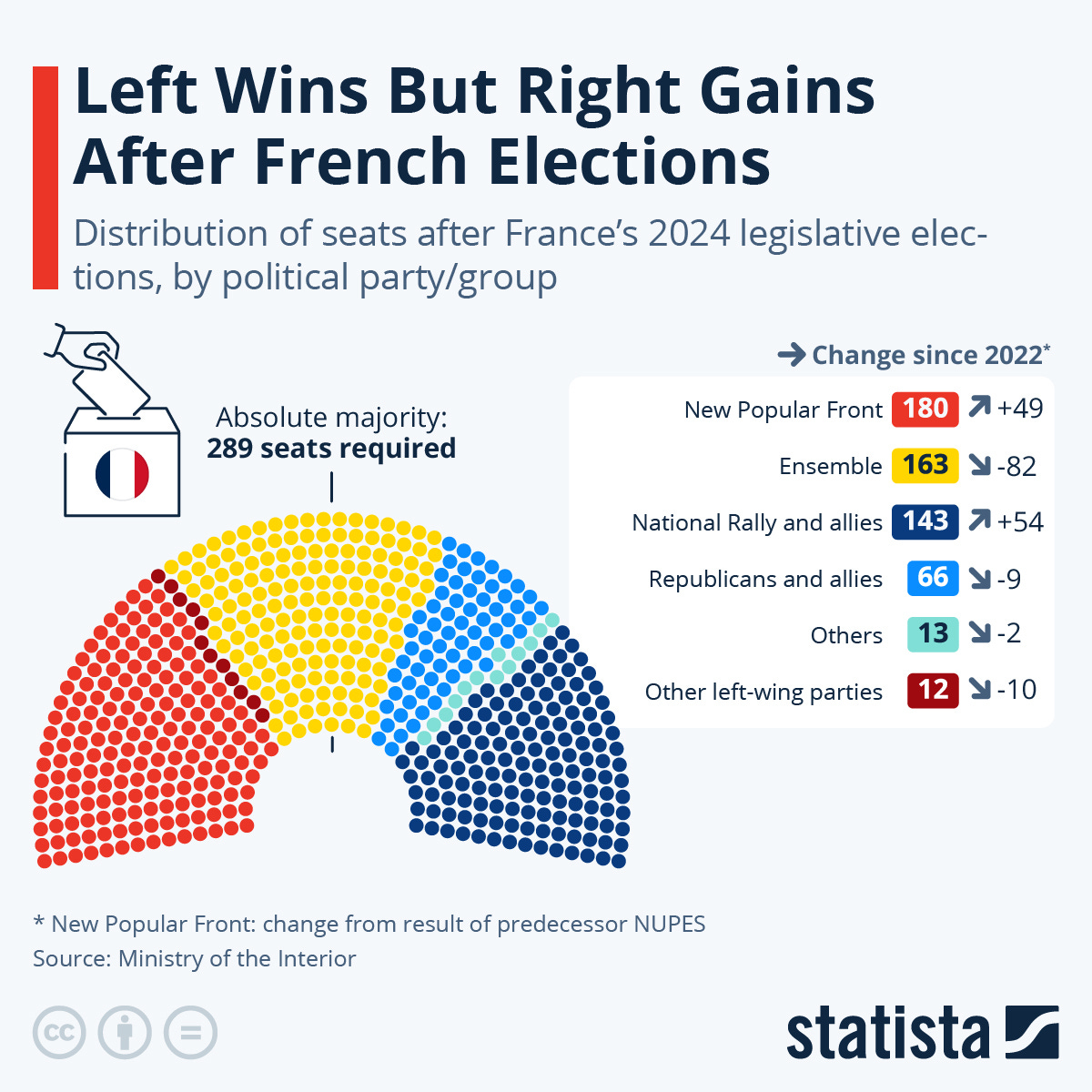
Source: Statista
The NFP’s surprise victory also underscores the new political reality in which we find ourselves, namely one where far-left populists like Jean-Luc Mélenchon (the spiritual leader of the NFP) can win national elections, as their seemingly radical politics are re-interpreted as moderate against the juxtaposition of an ever-intensifying far-right. Running on a platform of raising the minimum wage, increasing taxes on the rich and lowering the retirement age, Mélenchon’s most controversial position has undoubtedly been his refusal to condemn Hamas’ October 7th attacks which saw hundreds of Israeli civilians killed and captured. Despite this controversy, and others surrounding remarks widely interpreted to be anti-Semitic, Mélenchon’s coalition waltzed into an unlikely electoral victory, with a plurality of French voters deeming the 72-year-old Trotskyist to be a preferable candidate to the National Rally’s youthful Jordan Bardella. Nonetheless, infighting and disunity threaten the fragile cohesion of the left-wing bloc, while the failure to win an outright majority means Mélenchon or any other NFP candidate is unlikely to become France’s next Prime Minister. What is clear, however, is that Mélenchon and the NFP’s pro-Palestine stances did not cost them the election in the same way it has other Western progressives in the past. Most vividly Jeremy Corbyn lost the 2019 UK general election, marred by an anti-Semitism scandal, while pro-Palestinian congressman Jamaal Bowman recently lost to his primary challenger in what is now the most expensive House of Representative primary race in US history.
While the sudden nature of this snap election prevents us from accessing high-resolution polling data, it is likely Mélenchon’s victory comes on the back of a showing from France’s large Muslim and Arab population. With 70% of France’s Muslims supporting Mélenchon in his 2022 bid for the presidency, this number is only likely to have improved with his high-profile agitation for Gaza. In his victory speech, Mélenchon emphasised the necessity of Palestinian recognition, an electoral promise that may become a reality if the NFP can provoke some centrist defections or improve its seat count at the next legislative election.
The United Kingdom
Protest votes can be incredibly risky in a first-past-the-post “winner takes all” voting system. While in France there are two rounds of voting, allowing for some degree of flexibility in the first round (and strategic voting/”lesser evil” voting in the second round), in the United Kingdom voters are afforded no such privilege. Forced to choose between their unelectable preferred candidate or an undesirable electable candidate, strategic voting is common in countries with a first-past-the-post electoral system like the US, Canada and the UK. In any usual election, the pressures of strategic voting would likely put off informed voters from voting independent or a minor party. However, because of vote splitting on the right, between the Conservatives and Reform, and the profound unpopularity of the Conservatives, nominally left-wing voters were given the opportunity to vote their conscience, fearless of a potential spoiled vote benefiting the Conservatives.
The ensuing result was a disproportionate Labour landslide victory, with Keir Starmer’s party earning 63% or 412 of 650 House of Commons seats, all while receiving just 34% of the vote. By contrast, Reform received an impressive 14% of the national vote share but earned just 5 seats. This averages out to a costly ratio of 823,000 votes per seat in the House of Commons, compared to Labour’s 24,000 votes per seat. I highlight these statistics to underscore just how stacked against minority parties and independents the UK’s electoral system is. Indeed, up until July 4th, only seven Independents had entered Parliament in seventy years. And yet, a well-coordinated political campaign has managed to elect 5 new pro-Palestine independents, one of which being the highly maligned Jeremy Corbyn.
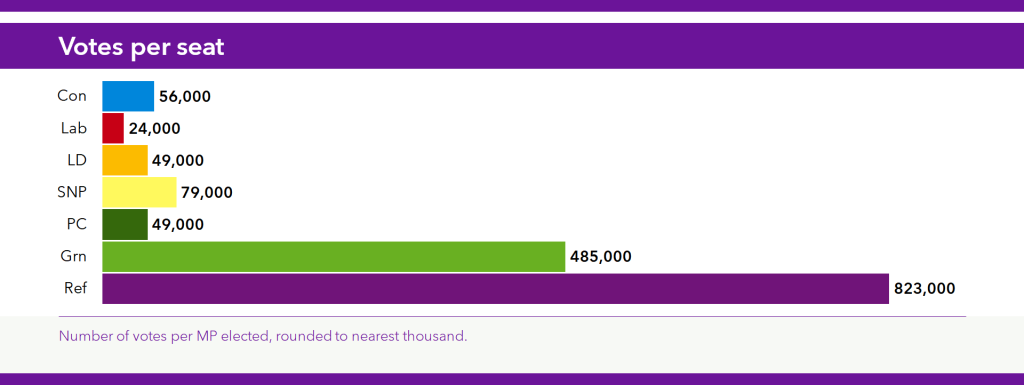
Source: Make Votes Matter
According to their website, The Muslim Vote (UK) is not a political party, nor is it affiliated with any one cleavage of the political spectrum. Instead, it is a national collective, mostly designed to mobilise and steer the “Muslim vote” towards pro-Palestinian candidates. For their efforts, they have been incredibly successful, dislodging the Shadow Paymaster General Johnathan Ashwood from his seat, and cutting deep into the majority vote in Labour strongholds. Indeed, the Muslim Vote was designed to be a coordinated protest vote, not against the incumbent Tory government, but against Keir Starmer, whom many felt had abandoned the Muslim community with his justification of Israeli war crimes and his procrastination to support a cease-fire. A protest vote of this variety is rare in democratic history, as voters typically cast protest votes against incumbents, not against the non-governing opposition. Of course, the five independents weren’t the only candidates that received a bump from their support of Palestine. The Greens won a historic 4 additional seats on a firmly pro-Palestinian platform, while the Lib Dems grew their share 6-fold, on a platform arguably to the left of Labour on Palestine. A particularly dramatic moment, however, was when the syncretistic Worker’s Party elected their first candidate, George Galloway, in the February 2024 Rochdale by-election. Running on a duplicitous anti-immigrant, pro-Muslim, pro-family values, pro-Brexit, pro-Palestine platform, George Galloway reflected on his victory by musing that “Keir Starmer and Rishi Sunak are two cheeks of the same backside and they both got well and truly spanked tonight”. Galloway would lose his seat to Labour’s Paul Waugh just 5 months later, but cumulatively at least 10 new MPs entered parliament this year with an explicitly pro-Palestinian mandate.
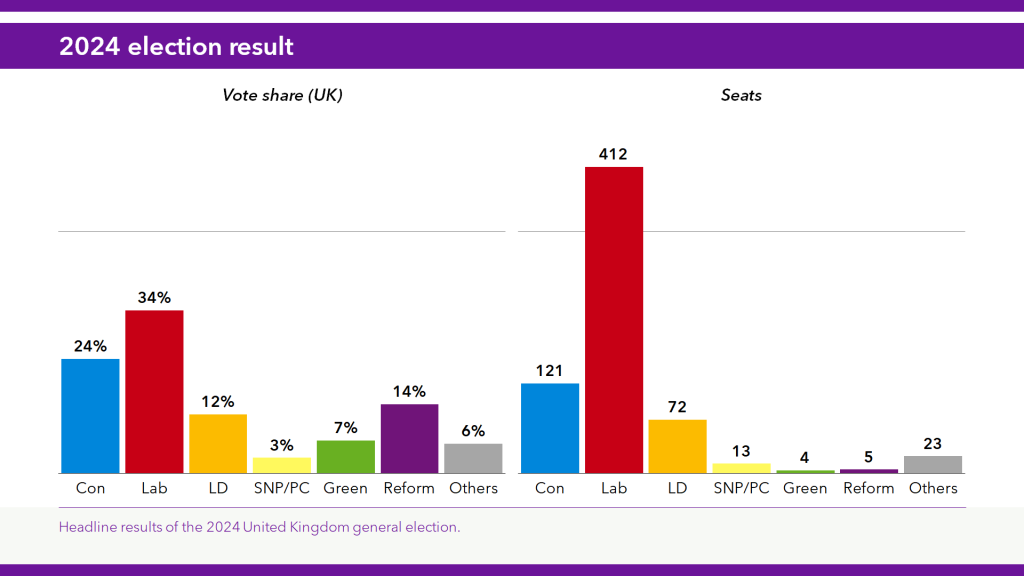
Source: Make Votes Matter
With Labour’s super majority, the pro-Palestinian Greens, SNP and Independent crossbench are unlikely to make much of an impact on the government’s stance. In Australia, where the older of the two Labor parties governs with just a 3-seat majority, the creation of an Australian “Muslim Vote” organisation has led Labor party leadership to panic. At least for now, The Muslim Vote (AU) seems interested in targeting only two seats in Western Sydney, representing the most densely populated Muslim electorates. Neither of these two electorates, however, has a Muslim population greater than 32%. By contrast, the Muslim Vote (UK) targeted 23 seats in the July general election, the largest of which had a Muslim population of 42%. This relatively depressed population density, coupled with Australia’s policy of compulsory voting, makes it unlikely that a Muslim independent will be successful unless they campaign on grassroots issues, in addition to Palestine.
Notwithstanding, under the current arrangement, two seats may be just enough to share the balance of power with the reliably pro-Palestinian Greens. Unlike in the UK, Australian voters do not need to worry about a spoiled vote as much. However, if The Muslim Vote miscalculates its preference ordering there is a scenario in which preferences are directed to the (right wing) Liberals through minor parties, or even with the elimination of Labor. In this scenario, The Muslim Vote would be entirely self-defeating. Nevertheless, a replication of the UK’s Muslim vote is within the realms of possibility, especially given the recent controversy surrounding senator Fatima Payman’s suspension from the Labor caucus.
The United States of America
Duverger’s Law states that two-party systems emerge when elections use a first-past-the-post/plurality voting system. According to the theory’s progenitor, minor parties are discouraged from forming as they know they will steal votes away from their preferred major party (thereby strengthening their least preferred major party). Simultaneously, voters are unlikely to cast their ballots sincerely, understanding that if their preferred minor party has no chance of winning, then voting for them would be a ‘waste’. Despite the popularity of the ‘Law’ in political science literature, this explanation has proved to be inadequate in explaining the prevalence of minor parties in numerous plurality systems, including Canada, India and the UK. One country where Duverger’s predictions have remained stubbornly consistent, however, is that of the United States of America.
The US has always been governed by two major parties, both in Congress and in the Presidency. Although these dominant parties have changed over the years (oftentimes being splinter groups of a pre-existing major party), a third-party Presidential candidate has never won more than 28% of the popular vote and 88 Electoral College votes. This presents a challenge for candidates wishing to campaign outside of the two-party system, with American independents, such as Vermont Senator Bernie Sanders, often caucusing with one of the two major parties. Consequently, America does not have a strong culture of protest voting, at least in general elections.
During party primaries, however, voters are given the opportunity to elect fringe candidates to become their party’s nominee, including against incumbents. Although Joe Biden had breezed through a mostly uncontested Presidential primary, the incumbent faced significant backlash from Young voters and Muslims, over his handling of the Israel-Gaza war. With pro-Palestinian organisers encouraging voters to cast a ballot for “uncommitted”, about 1/10 Democrats (nationally) chose absolutely no one, over the Presidential incumbent Joe Biden. This is roughly 3% higher than the 7% average in a non-competitive race, and almost double the usual amount if we count minor candidate protest votes. In Michigan, where Joe Biden won by 150,000 votes in 2020, an astounding 100,000 voters cast their primary ballots for “uncommitted”. Similarly, in Wisconsin “uninstructed” received double the votes Joe Biden won by in the last general action.
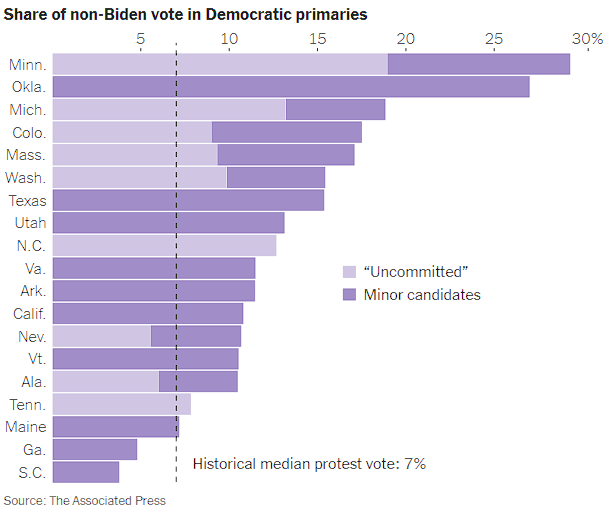
Despite the strong message coming from these swing states, Biden has remained characteristically uncompromising in his support of Israel, even as the IDF tramples over his ever-mandering “red line” on Rafah. As conversations have shifted towards Biden’s age, following his calamitous debate performance, the chorus of party insiders demanding his resignation has all but completely crowded out the voice of the protest voters. Ironically, this has left the Republican congressional primary as the most high-profile battleground for pro-Palestinian foreign policy.
Likely motivated more by a penchant for isolationism than human rights, several high-profile GOP-affiliated commentators and candidates have come out in support of the Palestinian cause, or more accurately, in support of cutting aid to Israel. Candace Owens, Joe Rogan and Tucker Carlson have all criticised Israel’s handling of the war, with Rogan and Owens going as far as calling the war an act of genocide. Meanwhile, several GOP congressional primaries have been fought on the issue of Middle Eastern foreign policy. Kentucky Congressman Thomas Massie convincingly won his primary re-election bid, despite significant spending by a super PAC associated with the pro-Israel lobbying group AIPAC. Meanwhile, the fire-arms YouTuber and GOP primarily challenger Brandon Herrera came within 400 votes of ousting the AIPAC-backed incumbent, Tony Gonzales. Running on an ‘America First’ platform, Herrera’s opposition to foreign aid, including aid towards Israel, was brought centre stage in the campaign. In reaction to AIPAC’s accusation that he was anti-Israel, Herrera would tweet “I’m not anti-Israel, I’m anti Israel buying American elections. How many millions did you spend on this race alone? You make “Russian collusion” look like a fucking joke.”
While the Republican party is unlikely to adopt a pro-Palestinian agenda anytime soon, the GOP will have to contend with the inherent contradiction of opposing foreign aid, while ignoring the largest cumulative recipient of foreign aid, Israel. Similarly, the Democrats will have to contend with a demoralised voter base, the youngest of whom sympathise more with Palestinians than they do Israelis.
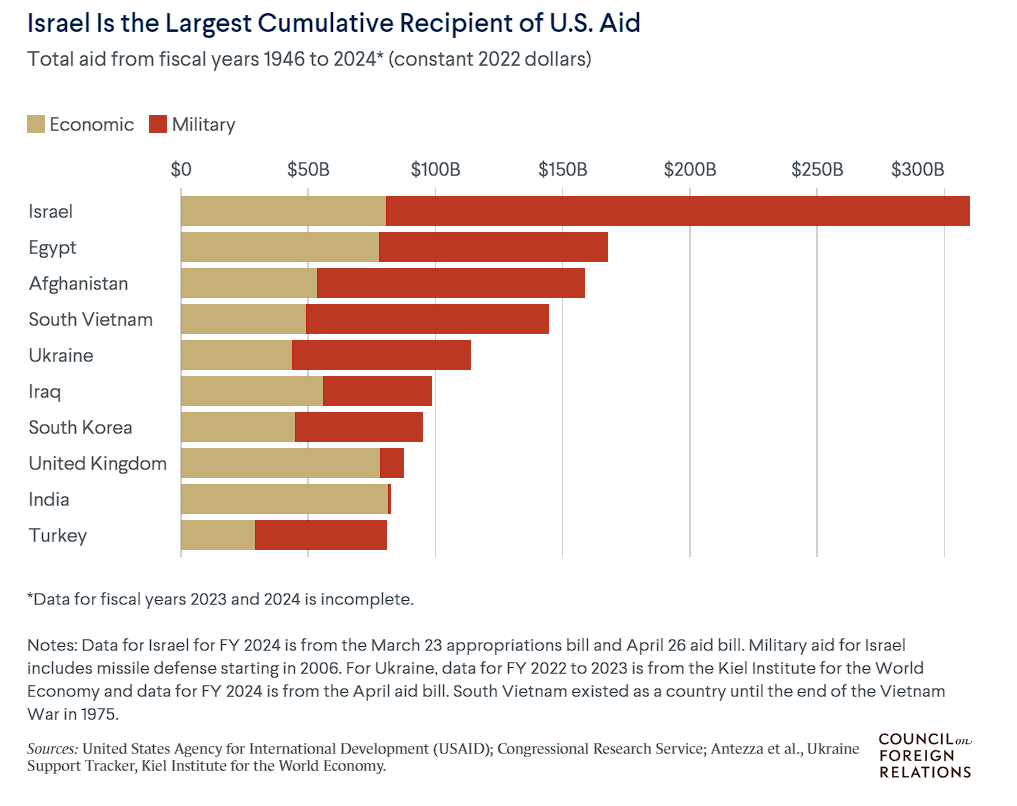
Protest Votes and Democracy
Protest votes are a necessary feature of a functioning democracy. In situations where an electoral system discourages or outright prohibits sincere voting, casting a ballot for a spoiler candidate or a casting voided ballot can be a powerful signal to lawmakers that your system is due for reform. Likewise, abstention can be powerful too, in systems of compulsory voting. Nonetheless, like with all collective action problems in economics, the best results require coordination. Casting a lone protest vote, devoid of a system of coordination like the Muslim vote or uncommitted initiative, is about as useful as not showing up at all. And not showing up at all is worse than useless, it is harmful. By refusing to vote you will signal to candidates that they can win without earning the votes of constituents of your demographic.
To enhance the power of your vote, you need to be a high-propensity, high-information voter, that is disciplined when it comes to your policy agenda. As the pro-Palestine protest vote shows, even electoral mechanisms that tend to produce a two-party system can be overcome. Independent of one’s political beliefs, the strategies and philosophies underpinning the pro-Palestinian protest vote should be taken seriously as a blueprint for effective political change.



